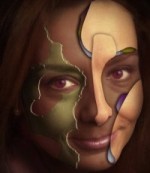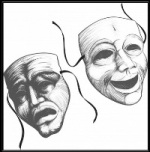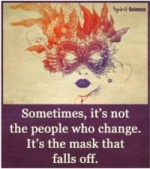Drop the Mask: The Freedom of Living an Authentic Life

Addiction is a mask. We wear the mask of alcoholism and/or addiction because we can’t – or simply don’t want to – deal with day-to-day existence.
“We withdrew from society, from life itself.” (Bill Wilson)
This article aptly describes the life-in-recovery process.
“It takes courage to grow up and become who you really are.” ~e.e Cummings
By Silken Laumann
This article was originally posted on the tiny buddha website.
Here is an unsettling idea: Most of us are not who we think we are. We are not the people that we bring to work, we are not the people we show to our parents and children, and sometimes we are not the people we show our friends.
Most of us go through our entire lives wearing a series of masks.
We have different masks for different purposes and occasions. The “perfect” mask of someone who’s always strong, positive, and together; the professional mask for today’s meeting; the expert mask that we put on when teaching or advising; the malleable and energetic one we put on when selling our skills or flogging our wares.

Recovery is Removing the Mask by Marilyn Davis.
Our masks become so comfortable we lose awareness that we are wearing them. But make no mistake, the masks that we wear are not who we are.
Those masks that we put on to protect ourselves, that we reach for to be taken seriously, that we don because we think we should be that soft spoken, outgoing, or strong, these masks are not who we are.
Beneath our masks are real, sentient human beings, people with opinions and passions, people who can be angry and impatient; human beings who can be deeply empathetic and compassionate.
If we want to be reminded of what a real-life, uncensored human looks like, spend some time with a baby. These little cherubs laugh with their whole bodies, and they do it frequently and loudly. They cry with gusto, their bellies expanding like a balloon when they are building up to a real howl.
If they are already talking, they voice their opinions clearly and honestly. “Don’t like it. Want more. No, not going.”

The Masks of Addiction and Recovery by William White.
Their questions are beautiful and profound because of their honesty and completely untarnished way of experiencing the world.
Most of all, when watching these little humans, we can observe that wherever they are, whatever they are doing, they are fully in it. We work our whole lives to recapture this authenticity and ability to be present.
Sometime early in our development, something tragic happens. Maybe it happens the first time we are given signals that being jealous of a sibling is not appropriate, that crying when we are hurt is being dramatic, or that being loud is annoying. We get signals that the way we are behaving is not making the adults around us happy.
Little by little, bit by bit, we adopt socially acceptable behaviors, facial expressions, voice volumes, and agreeable ideas that harden into a series of masks.
In any given moment, our truth lies beneath the masks we wear, sometimes screaming for oxygen. We work really hard to stuff our truth down, to temper ourselves to fit in, to follow the rather rigid rules of social acceptability.
We need to be authentic to fully express ourselves in the world. When we try to stuff down our inner voice or pretend it doesn’t exist, it fights back. Stuffed inside our body, repressed feelings can lead to depression, insomnia, physical pain, and if we continue, diseases like cancer and heart disease. This is real. Inauthenticity makes us sick.
Thankfully, our authentic selves have enormous strength. I say thankfully because these breakdowns of our coping mechanisms often lead us to our greatest insights about ourselves.
The people I know who are fully and authentically themselves have been led there by difficult events, by a crisis that shook their world, by insights that have loosened their masks long enough to reveal the peoplw underneath waiting to breathe and live life fully.
This has definitely been my experience. My divorce was a crisis point. Although it was over a decade ago, it remains the most transforming single event of my life. In an instant, any ideas that my former life had created were blown to smithereens.
I saw with glaring clarity how the married person I had become was a role I was playing. For years I had been editing my behavior and my dreams to fit what I thought I was supposed to be. I wasn’t even sure who that person was, but I knew she was more patient and her energy was smaller and it didn’t overwhelm people.
Worse, I began to understand that I didn’t even know who I was, that I’d been wearing the mask of Olympic athlete, public figure, wife, and mother for so long that I wondered if I was still in there.
When my marriage blew up, I was possessed with renewed energy. This wasn’t because my husband was a rotten guy who had kept me under his thumb; this was because the pain, the upheaval, the shock of what happened broke my mask in one fell swoop. A life crisis put me back on the path of discovering my authenticity.
If all this sounds a little hokey to you, think about something really difficult you have experienced, like the loss of a loved one, the loss of a job, the end of a primary relationship. Often in these times of extreme crisis, we make deep connections with others—the friends that support us, the sister who holds our hand by a parent’s death bed. In crisis, people can drop their masks and simply reach out for one another, human to human.
There is something so magical and refreshing about this connection that many people never come back fully into their mask-wearing afterward. Life has new meaning, and the desire to live connected and live authentically becomes a motto for life.
When I shredded the masks I was wearing, I found myself filled with creative energy. It turns out that all that pretending is pretty exhausting. When I stopped trying to be who I thought I was supposed to be, it was like I plugged my soul into a current of electric life energy. I started writing books, taking courses, painting, studying yoga, and doing all sort of things I didn’t consciously know I wanted to do.
Through the pain of upheaval and loss, I freed myself of the personas that I’d layered on top of my authenticity for decades.
Reconnecting with my truth was a new and exciting adventure as well as a coming home. In terms of my mental and physical health, I believe coming home to myself saved my life. It could save yours.
So say what you really feel. Make the choices you really want to make. Forget who you think you’re supposed to be and let yourself be as you are. At the very least, finding the courage to reconnect with the self inside yourself could be the single most liberating act of your life.
 Four-time Olympian Silken Laumann is one of Canada’s most inspirational leaders, a best-selling author, and a highly recognizable and beloved athlete. As an elite athlete, mental health and child advocate, speaker, writer, and life coach, Silken has made her work reaching her own potential and helping others reach theirs.
Four-time Olympian Silken Laumann is one of Canada’s most inspirational leaders, a best-selling author, and a highly recognizable and beloved athlete. As an elite athlete, mental health and child advocate, speaker, writer, and life coach, Silken has made her work reaching her own potential and helping others reach theirs.

























